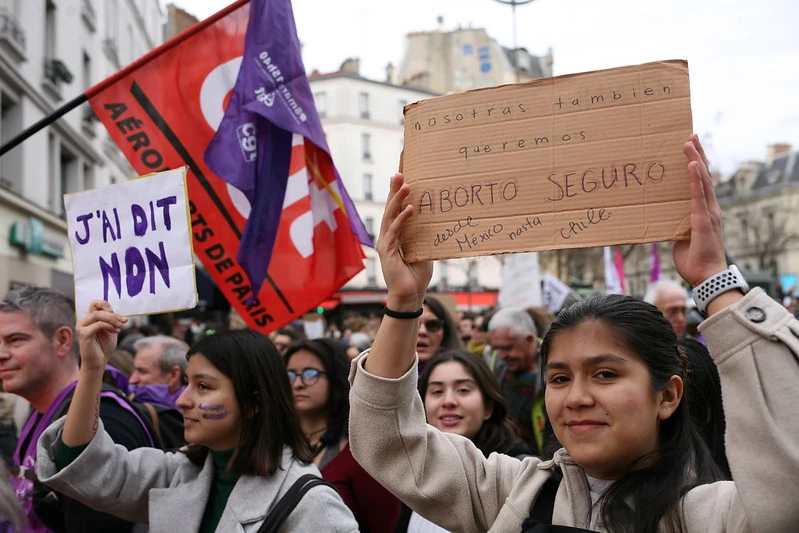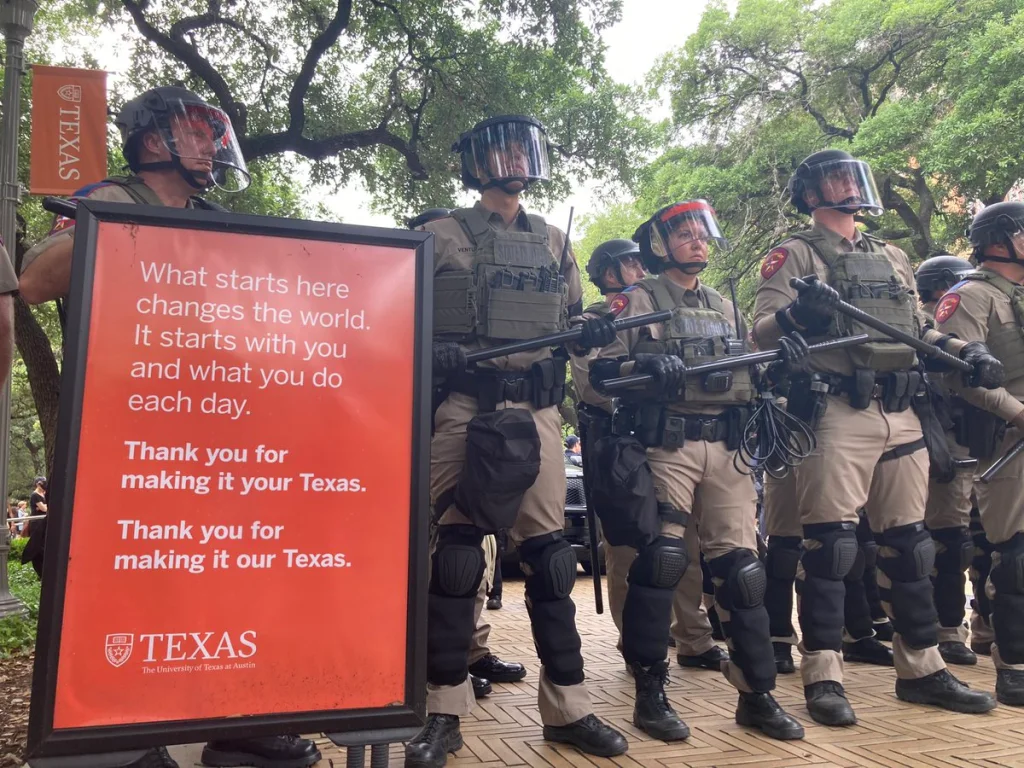I really wish my computer would stop auto-correcting “Highwomen” to “highwayman.”
I thought I was going to write my first Home with the Armadillo post about these Texas Republican dirtbags — Greg Abbott and Dan Crenshaw and Matt Schaefer and the whole mess of NRA ass-kissers and murder apologists who share their awful politics — but then this record from The Highwomen came out, and I realized I’m done with men and their self-interested macho bullshit right now.
If you don’t know what I’m talking about, go grab a beer and find your porch or your stoop or your yard and drag your speakers outside and cancel your plans and fire this fucker up.
If you do know what I’m talking about, rewind the record and let’s listen again. All set? Okay.
Damn. Look, I’m having trouble starting this because all I wanna do is stare into the middle distance and drink my High Life and listen to this fucking record.
I’m only going to talk about the lead track right now, though — “Highwomen,” a reworking of the 1977 Jimmy Webb song “The Highwayman,” made famous in 1985 by the sorta-eponymous outlaw country supergroup The Highwaymen, made up of Johnny Cash, Willie Nelson, Waylon Jennings, and Kris Kristofferson.
Decades later, the Highwomen are a new supergroup who aren’t just rewriting or reimagining what it means to be outsiders in the scene — they are outlaws in a truer sense than Cash and the boys could ever have dreamed of being. They are women writing, playing, and performing country music in a genre hostile to their very presence, a genre currently stalled out on red Solo cups and rednecks, where women appear mostly to put their bare feet on the dashboard or date the wrong kind of asshole — an asshole who is not a redneck who drinks from red Solo cups.
The Highwomen’s power is fundamentally collective. They are Americana star Brandi Carlile, high-demand Nashville singer-songwriter Natalie Hemby, and two Texans, Amanda Shires (violinist, member of the Texas Playboys and her partner Jason Isbell’s band, the 400 Unit) and Maren Morris, the poppiest of the bunch, a hit-slinger from my hometown of Arlington. Individually they have done amazing work; but the lie of success for women in country music is the lie of success for women everywhere — encompassed in the idea that there can only be one woman on the bill or the charts or the stage at a time, her presence carefully placed so as not to offend the delicate sensibilities of Team Solo Cup. So the Highwomen rejected it. They decided to work together.
The Highwomen are also fed up the with the self-interested macho bullshit, I think.
Let’s be clear: “The Highwayman” is a beautiful fucking song. Webb’s original has a smooth, songwritery-yacht-rock feel, and The Highwaymen’s version (which went to number one) brings a carefree darkness to the narrative, which tells the story of a highwayman (who fucks people up), a sailor (who sails), a (Hoover) dam builder (who dies at work), and a starship captain (who flies into the future) — all of them doomed, the conceit being that they are all reincarnations of the same soul.
The Highwomen blow that shit out of the water with “Highwomen,” which they rewrote with Webb to feature a Honduran mother fleeing American interventionism in Central America, a healer-witch burned at Salem, a Freedom Rider from the American South, and a woman preacher.
I love “The Highwayman.” It is one of my all-time favorite country songs, sung together by some of my all-time favorite country artists. But I can never hear it the same way again. Because now I know. “The Highwayman” is a funereal campfire song for men who see themselves in odes to power and progress — in the terrible lie of a masculinity centrally concerned with taking, robbing, keeping, conquering.
“Highwomen” is an anthem of collective liberation. It is a paean to struggle and resilience. It is a song for women to sing and for everyone to hear.
It opens: I was a highwoman, and a mother from my youth.
A mother from my youth. Did that hit you the way it hit me? It hit me hard and full, the whole story, a cascade-montage of still images of what it would mean to the woman who describes herself in such a way. To be a mother and a youth. I saw her life and I saw her wholly, in those five words. The song goes on:
For my children, I did what I had to do
My family left Honduras when they killed the Sandinistas
We followed a coyote through the dust of Mexico
Every one of them except for me survived
And I am still alive
She carries on to escape terror (what the United States helped bring to bear) in Central America, to shepherd her family to a different life, to die but to know her people lived. For a greater good, not for her own survival but for a better future. She died in her body but never in soul; she lives in the legacy she gave her children, a dream of freedom, a dream of safety.
“The Highwayman” opens differently.
I was a highwayman, along the coach roads I did ride.
With sword and pistol by my side
Many a young maid lost her baubles to my trade
Many a soldier shed his lifeblood on my blade
The bastards hung me in the spring of twenty-five
But I am still alive
Certainly “sword and pistol by my side” paints a picture of a man, but what man? We know him, of course, from so many and maybe too many stories. Is he Robin Hood or something more sinister? We don’t know his motivations; his status as prototypical outlaw is enough to carry us into the sailor’s story and then the third verse, about the dam builder who falls into the Colorado, which finally hints at something vaguely more populist or political, nipping at the barest critique of (perhaps!) capitalism. But then comes the starship captain, a fearless explorer who carries us off into the universe, and the picture is complete: this is a song about the way men have moved through and measured time, a story of progress via technology and taking, of a future centered on individualism, of capture and conquer. Of mastery of the unknown and, as history has demonstrated, of the deadly submission of those who dared to already know, deeply and intimately, the white man’s unknown.
Is that too far a leap? Am I reading too much into this song? I’ve switched to wine now. Oh well. Let’s run with it.
“Highwomen” continues with verse-stories not of individual triumph but of resistance to oppression both raced and gendered — a woman hung in Salem for healing her community, a Freedom Rider shot for riding the bus through Mississippi, a preacher silenced for daring to speak her God’s truth as a woman. These things that women have done and will always do because we must, in the face of silence and death and worse, even when we are told that we are not strong enough, smart enough, brave enough, right enough. We are told that our concerns are not urgent, that they will be addressed some other time, when a ripeness is fulfilled but whose season never comes.
The verses slay me, but it is the contrast in the endings of these songs that stay with me.
In “The Highwayman,” embodying their individual experiences and vowing to return in the person of another man on the cusp of progress, the men sing together: “I’ll come back again, and again, and again ….” It is a refrain that, for many of us, does not signal comfort but rather tragedy. The highwayman will return, to rob us? The sailor will take to the seas again, to map indigenous lands? The dam builder reappears, to reroute our resources? The astronaut takes off for — well, we can only imagine. Erasure. Pain. Silence. A future for none but the few.
Instead, in “Highwomen,” the women sing together: “We’ll come back again.” The refugee, the witch, the Freedom Rider, and the preacher come back together from beyond to make a promise.
To the kind of man who fears equality and justice, this must be terrifying. But this isn’t a threat. It’s a covenant. It’s a fucking covenant.
They sing:
We are The Highwomen
Singing stories still untold
We carry the sons you can only hold
We are the daughters of the silent generations
You send our hearts to die alone in foreign nations
It may return to us as tiny drops of rain
But we will still remain
And we’ll come back again, and again, and again, and again, and again …
And what fucking kills me absolutely is this final indictment of the war-mongering thirst of the patriarchy — “you send our hearts to die alone in foreign nations,” a line so full of critique and yet so restrained, a reminder that our survival as people is bound together regardless of gender and in fact in spite of it, that we are families and communities subject to the whims of power-hungry fools who believe their own bullshit stories about power and property. In this verse, I hear the quiet mmmhmm of the women who have always known better — Mema as she refills her iced tea, Auntie as she snaps the ends off of the green beans, Sissy as she contours her brows.
We’ll come back again, and again, and again, and again, and again.
Until we don’t have to. Until our work is done.





Leave a comment